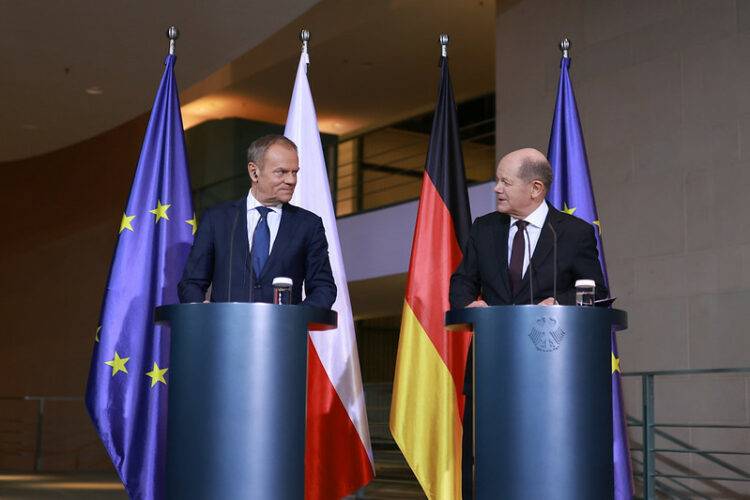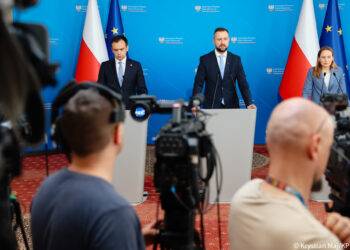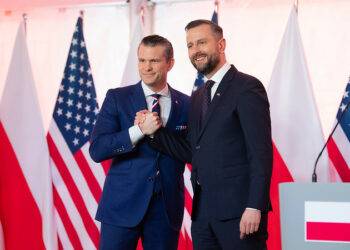In a landmark meeting that signifies the deepening ties between Poland and Germany, Prime Minister Donald Tusk and Chancellor Olaf Scholz have pledged a reinforced commitment to European unity, peace, and security. The high-profile gathering in Berlin underscored both nations’ resolve to navigate the complex geopolitical landscape of Europe together.
During the encounter, Chancellor Scholz expressed Germany’s shared responsibility for Poland’s security, emphasizing the intertwined destiny of the two nations within the broader European context. This statement comes at a time when Europe grapples with the repercussions of ongoing aggression in Ukraine, showcasing the urgent need for a cohesive and robust response to external threats.
“Poland’s security is intrinsically linked to our own; we are co-responsible,” Chancellor Scholz remarked, highlighting the interconnected destiny of European nations in the face of external threats. This sentiment was echoed by Tusk, who stressed the importance of solidarity in ensuring the continent’s future. “What binds us today is a desire for peace, stability, and security across Europe, more critical now than ever as we face the challenges posed by conflicts at our borders,” Tusk noted.
The meeting also served as a poignant reminder of the shared, tumultuous history between the two countries, with Scholz acknowledging the 85th anniversary of Germany’s assault on Poland. “The unspeakable suffering inflicted by Germany on Poland during the war was a crime, one we are deeply aware of and for which we bear a heavy responsibility,” Scholz said, emphasizing the importance of remembrance and reconciliation.
Discussions between Tusk and Scholz were robust, covering a wide range of topics, notably the enhancement of Europe’s defense capabilities and the revival of the Weimar Triangle—an influential diplomatic platform for Poland, Germany, and France. Both leaders agreed on the necessity of a stronger, more unified European defense strategy to counteract regional security threats efficiently.
Supporting Ukraine and Ensuring Regional Stability
The situation in Ukraine was a focal point of the talks, with both Tusk and Scholz reiterating their countries’ support for Ukraine’s sovereignty and territorial integrity. “Our collaboration within the EU and NATO frameworks is pivotal in bolstering our collective defense and supporting nations under threat,” Scholz stated.
Beyond security, the leaders touched upon economic cooperation and the environmental challenges facing Europe. Tusk advocated for a balanced approach to economic growth and ecological sustainability, suggesting that the EU can be a powerhouse not only in economic and scientific terms but also as a leader in environmental stewardship.
As the meeting concluded, Tusk and Scholz presented a united front, committed to fostering a peaceful and stable Europe. Their discussions in Berlin have laid the groundwork for enhanced Polish-German cooperation and a stronger, more cohesive European Union.
Tusk’s visit to Berlin, following his talks in Paris with French President Emmanuel Macron, is a testament to the concerted efforts by European leaders to ensure the continent’s security and stability. By reinforcing the Polish-German partnership, Tusk and Scholz have reiterated their dedication to safeguarding Europe’s peace and upholding the values of freedom and democracy in the face of adversity.
- Follow us on X (Twitter) to stay up to date with News from Poland.
In a landmark meeting that signifies the deepening ties between Poland and Germany, Prime Minister Donald Tusk and Chancellor Olaf Scholz have pledged a reinforced commitment to European unity, peace, and security. The high-profile gathering in Berlin underscored both nations’ resolve to navigate the complex geopolitical landscape of Europe together.
During the encounter, Chancellor Scholz expressed Germany’s shared responsibility for Poland’s security, emphasizing the intertwined destiny of the two nations within the broader European context. This statement comes at a time when Europe grapples with the repercussions of ongoing aggression in Ukraine, showcasing the urgent need for a cohesive and robust response to external threats.
“Poland’s security is intrinsically linked to our own; we are co-responsible,” Chancellor Scholz remarked, highlighting the interconnected destiny of European nations in the face of external threats. This sentiment was echoed by Tusk, who stressed the importance of solidarity in ensuring the continent’s future. “What binds us today is a desire for peace, stability, and security across Europe, more critical now than ever as we face the challenges posed by conflicts at our borders,” Tusk noted.
The meeting also served as a poignant reminder of the shared, tumultuous history between the two countries, with Scholz acknowledging the 85th anniversary of Germany’s assault on Poland. “The unspeakable suffering inflicted by Germany on Poland during the war was a crime, one we are deeply aware of and for which we bear a heavy responsibility,” Scholz said, emphasizing the importance of remembrance and reconciliation.
Discussions between Tusk and Scholz were robust, covering a wide range of topics, notably the enhancement of Europe’s defense capabilities and the revival of the Weimar Triangle—an influential diplomatic platform for Poland, Germany, and France. Both leaders agreed on the necessity of a stronger, more unified European defense strategy to counteract regional security threats efficiently.
Supporting Ukraine and Ensuring Regional Stability
The situation in Ukraine was a focal point of the talks, with both Tusk and Scholz reiterating their countries’ support for Ukraine’s sovereignty and territorial integrity. “Our collaboration within the EU and NATO frameworks is pivotal in bolstering our collective defense and supporting nations under threat,” Scholz stated.
Beyond security, the leaders touched upon economic cooperation and the environmental challenges facing Europe. Tusk advocated for a balanced approach to economic growth and ecological sustainability, suggesting that the EU can be a powerhouse not only in economic and scientific terms but also as a leader in environmental stewardship.
As the meeting concluded, Tusk and Scholz presented a united front, committed to fostering a peaceful and stable Europe. Their discussions in Berlin have laid the groundwork for enhanced Polish-German cooperation and a stronger, more cohesive European Union.
Tusk’s visit to Berlin, following his talks in Paris with French President Emmanuel Macron, is a testament to the concerted efforts by European leaders to ensure the continent’s security and stability. By reinforcing the Polish-German partnership, Tusk and Scholz have reiterated their dedication to safeguarding Europe’s peace and upholding the values of freedom and democracy in the face of adversity.
- Follow us on X (Twitter) to stay up to date with News from Poland.
In a landmark meeting that signifies the deepening ties between Poland and Germany, Prime Minister Donald Tusk and Chancellor Olaf Scholz have pledged a reinforced commitment to European unity, peace, and security. The high-profile gathering in Berlin underscored both nations’ resolve to navigate the complex geopolitical landscape of Europe together.
During the encounter, Chancellor Scholz expressed Germany’s shared responsibility for Poland’s security, emphasizing the intertwined destiny of the two nations within the broader European context. This statement comes at a time when Europe grapples with the repercussions of ongoing aggression in Ukraine, showcasing the urgent need for a cohesive and robust response to external threats.
“Poland’s security is intrinsically linked to our own; we are co-responsible,” Chancellor Scholz remarked, highlighting the interconnected destiny of European nations in the face of external threats. This sentiment was echoed by Tusk, who stressed the importance of solidarity in ensuring the continent’s future. “What binds us today is a desire for peace, stability, and security across Europe, more critical now than ever as we face the challenges posed by conflicts at our borders,” Tusk noted.
The meeting also served as a poignant reminder of the shared, tumultuous history between the two countries, with Scholz acknowledging the 85th anniversary of Germany’s assault on Poland. “The unspeakable suffering inflicted by Germany on Poland during the war was a crime, one we are deeply aware of and for which we bear a heavy responsibility,” Scholz said, emphasizing the importance of remembrance and reconciliation.
Discussions between Tusk and Scholz were robust, covering a wide range of topics, notably the enhancement of Europe’s defense capabilities and the revival of the Weimar Triangle—an influential diplomatic platform for Poland, Germany, and France. Both leaders agreed on the necessity of a stronger, more unified European defense strategy to counteract regional security threats efficiently.
Supporting Ukraine and Ensuring Regional Stability
The situation in Ukraine was a focal point of the talks, with both Tusk and Scholz reiterating their countries’ support for Ukraine’s sovereignty and territorial integrity. “Our collaboration within the EU and NATO frameworks is pivotal in bolstering our collective defense and supporting nations under threat,” Scholz stated.
Beyond security, the leaders touched upon economic cooperation and the environmental challenges facing Europe. Tusk advocated for a balanced approach to economic growth and ecological sustainability, suggesting that the EU can be a powerhouse not only in economic and scientific terms but also as a leader in environmental stewardship.
As the meeting concluded, Tusk and Scholz presented a united front, committed to fostering a peaceful and stable Europe. Their discussions in Berlin have laid the groundwork for enhanced Polish-German cooperation and a stronger, more cohesive European Union.
Tusk’s visit to Berlin, following his talks in Paris with French President Emmanuel Macron, is a testament to the concerted efforts by European leaders to ensure the continent’s security and stability. By reinforcing the Polish-German partnership, Tusk and Scholz have reiterated their dedication to safeguarding Europe’s peace and upholding the values of freedom and democracy in the face of adversity.
- Follow us on X (Twitter) to stay up to date with News from Poland.
In a landmark meeting that signifies the deepening ties between Poland and Germany, Prime Minister Donald Tusk and Chancellor Olaf Scholz have pledged a reinforced commitment to European unity, peace, and security. The high-profile gathering in Berlin underscored both nations’ resolve to navigate the complex geopolitical landscape of Europe together.
During the encounter, Chancellor Scholz expressed Germany’s shared responsibility for Poland’s security, emphasizing the intertwined destiny of the two nations within the broader European context. This statement comes at a time when Europe grapples with the repercussions of ongoing aggression in Ukraine, showcasing the urgent need for a cohesive and robust response to external threats.
“Poland’s security is intrinsically linked to our own; we are co-responsible,” Chancellor Scholz remarked, highlighting the interconnected destiny of European nations in the face of external threats. This sentiment was echoed by Tusk, who stressed the importance of solidarity in ensuring the continent’s future. “What binds us today is a desire for peace, stability, and security across Europe, more critical now than ever as we face the challenges posed by conflicts at our borders,” Tusk noted.
The meeting also served as a poignant reminder of the shared, tumultuous history between the two countries, with Scholz acknowledging the 85th anniversary of Germany’s assault on Poland. “The unspeakable suffering inflicted by Germany on Poland during the war was a crime, one we are deeply aware of and for which we bear a heavy responsibility,” Scholz said, emphasizing the importance of remembrance and reconciliation.
Discussions between Tusk and Scholz were robust, covering a wide range of topics, notably the enhancement of Europe’s defense capabilities and the revival of the Weimar Triangle—an influential diplomatic platform for Poland, Germany, and France. Both leaders agreed on the necessity of a stronger, more unified European defense strategy to counteract regional security threats efficiently.
Supporting Ukraine and Ensuring Regional Stability
The situation in Ukraine was a focal point of the talks, with both Tusk and Scholz reiterating their countries’ support for Ukraine’s sovereignty and territorial integrity. “Our collaboration within the EU and NATO frameworks is pivotal in bolstering our collective defense and supporting nations under threat,” Scholz stated.
Beyond security, the leaders touched upon economic cooperation and the environmental challenges facing Europe. Tusk advocated for a balanced approach to economic growth and ecological sustainability, suggesting that the EU can be a powerhouse not only in economic and scientific terms but also as a leader in environmental stewardship.
As the meeting concluded, Tusk and Scholz presented a united front, committed to fostering a peaceful and stable Europe. Their discussions in Berlin have laid the groundwork for enhanced Polish-German cooperation and a stronger, more cohesive European Union.
Tusk’s visit to Berlin, following his talks in Paris with French President Emmanuel Macron, is a testament to the concerted efforts by European leaders to ensure the continent’s security and stability. By reinforcing the Polish-German partnership, Tusk and Scholz have reiterated their dedication to safeguarding Europe’s peace and upholding the values of freedom and democracy in the face of adversity.
- Follow us on X (Twitter) to stay up to date with News from Poland.
In a landmark meeting that signifies the deepening ties between Poland and Germany, Prime Minister Donald Tusk and Chancellor Olaf Scholz have pledged a reinforced commitment to European unity, peace, and security. The high-profile gathering in Berlin underscored both nations’ resolve to navigate the complex geopolitical landscape of Europe together.
During the encounter, Chancellor Scholz expressed Germany’s shared responsibility for Poland’s security, emphasizing the intertwined destiny of the two nations within the broader European context. This statement comes at a time when Europe grapples with the repercussions of ongoing aggression in Ukraine, showcasing the urgent need for a cohesive and robust response to external threats.
“Poland’s security is intrinsically linked to our own; we are co-responsible,” Chancellor Scholz remarked, highlighting the interconnected destiny of European nations in the face of external threats. This sentiment was echoed by Tusk, who stressed the importance of solidarity in ensuring the continent’s future. “What binds us today is a desire for peace, stability, and security across Europe, more critical now than ever as we face the challenges posed by conflicts at our borders,” Tusk noted.
The meeting also served as a poignant reminder of the shared, tumultuous history between the two countries, with Scholz acknowledging the 85th anniversary of Germany’s assault on Poland. “The unspeakable suffering inflicted by Germany on Poland during the war was a crime, one we are deeply aware of and for which we bear a heavy responsibility,” Scholz said, emphasizing the importance of remembrance and reconciliation.
Discussions between Tusk and Scholz were robust, covering a wide range of topics, notably the enhancement of Europe’s defense capabilities and the revival of the Weimar Triangle—an influential diplomatic platform for Poland, Germany, and France. Both leaders agreed on the necessity of a stronger, more unified European defense strategy to counteract regional security threats efficiently.
Supporting Ukraine and Ensuring Regional Stability
The situation in Ukraine was a focal point of the talks, with both Tusk and Scholz reiterating their countries’ support for Ukraine’s sovereignty and territorial integrity. “Our collaboration within the EU and NATO frameworks is pivotal in bolstering our collective defense and supporting nations under threat,” Scholz stated.
Beyond security, the leaders touched upon economic cooperation and the environmental challenges facing Europe. Tusk advocated for a balanced approach to economic growth and ecological sustainability, suggesting that the EU can be a powerhouse not only in economic and scientific terms but also as a leader in environmental stewardship.
As the meeting concluded, Tusk and Scholz presented a united front, committed to fostering a peaceful and stable Europe. Their discussions in Berlin have laid the groundwork for enhanced Polish-German cooperation and a stronger, more cohesive European Union.
Tusk’s visit to Berlin, following his talks in Paris with French President Emmanuel Macron, is a testament to the concerted efforts by European leaders to ensure the continent’s security and stability. By reinforcing the Polish-German partnership, Tusk and Scholz have reiterated their dedication to safeguarding Europe’s peace and upholding the values of freedom and democracy in the face of adversity.
- Follow us on X (Twitter) to stay up to date with News from Poland.
In a landmark meeting that signifies the deepening ties between Poland and Germany, Prime Minister Donald Tusk and Chancellor Olaf Scholz have pledged a reinforced commitment to European unity, peace, and security. The high-profile gathering in Berlin underscored both nations’ resolve to navigate the complex geopolitical landscape of Europe together.
During the encounter, Chancellor Scholz expressed Germany’s shared responsibility for Poland’s security, emphasizing the intertwined destiny of the two nations within the broader European context. This statement comes at a time when Europe grapples with the repercussions of ongoing aggression in Ukraine, showcasing the urgent need for a cohesive and robust response to external threats.
“Poland’s security is intrinsically linked to our own; we are co-responsible,” Chancellor Scholz remarked, highlighting the interconnected destiny of European nations in the face of external threats. This sentiment was echoed by Tusk, who stressed the importance of solidarity in ensuring the continent’s future. “What binds us today is a desire for peace, stability, and security across Europe, more critical now than ever as we face the challenges posed by conflicts at our borders,” Tusk noted.
The meeting also served as a poignant reminder of the shared, tumultuous history between the two countries, with Scholz acknowledging the 85th anniversary of Germany’s assault on Poland. “The unspeakable suffering inflicted by Germany on Poland during the war was a crime, one we are deeply aware of and for which we bear a heavy responsibility,” Scholz said, emphasizing the importance of remembrance and reconciliation.
Discussions between Tusk and Scholz were robust, covering a wide range of topics, notably the enhancement of Europe’s defense capabilities and the revival of the Weimar Triangle—an influential diplomatic platform for Poland, Germany, and France. Both leaders agreed on the necessity of a stronger, more unified European defense strategy to counteract regional security threats efficiently.
Supporting Ukraine and Ensuring Regional Stability
The situation in Ukraine was a focal point of the talks, with both Tusk and Scholz reiterating their countries’ support for Ukraine’s sovereignty and territorial integrity. “Our collaboration within the EU and NATO frameworks is pivotal in bolstering our collective defense and supporting nations under threat,” Scholz stated.
Beyond security, the leaders touched upon economic cooperation and the environmental challenges facing Europe. Tusk advocated for a balanced approach to economic growth and ecological sustainability, suggesting that the EU can be a powerhouse not only in economic and scientific terms but also as a leader in environmental stewardship.
As the meeting concluded, Tusk and Scholz presented a united front, committed to fostering a peaceful and stable Europe. Their discussions in Berlin have laid the groundwork for enhanced Polish-German cooperation and a stronger, more cohesive European Union.
Tusk’s visit to Berlin, following his talks in Paris with French President Emmanuel Macron, is a testament to the concerted efforts by European leaders to ensure the continent’s security and stability. By reinforcing the Polish-German partnership, Tusk and Scholz have reiterated their dedication to safeguarding Europe’s peace and upholding the values of freedom and democracy in the face of adversity.
- Follow us on X (Twitter) to stay up to date with News from Poland.
In a landmark meeting that signifies the deepening ties between Poland and Germany, Prime Minister Donald Tusk and Chancellor Olaf Scholz have pledged a reinforced commitment to European unity, peace, and security. The high-profile gathering in Berlin underscored both nations’ resolve to navigate the complex geopolitical landscape of Europe together.
During the encounter, Chancellor Scholz expressed Germany’s shared responsibility for Poland’s security, emphasizing the intertwined destiny of the two nations within the broader European context. This statement comes at a time when Europe grapples with the repercussions of ongoing aggression in Ukraine, showcasing the urgent need for a cohesive and robust response to external threats.
“Poland’s security is intrinsically linked to our own; we are co-responsible,” Chancellor Scholz remarked, highlighting the interconnected destiny of European nations in the face of external threats. This sentiment was echoed by Tusk, who stressed the importance of solidarity in ensuring the continent’s future. “What binds us today is a desire for peace, stability, and security across Europe, more critical now than ever as we face the challenges posed by conflicts at our borders,” Tusk noted.
The meeting also served as a poignant reminder of the shared, tumultuous history between the two countries, with Scholz acknowledging the 85th anniversary of Germany’s assault on Poland. “The unspeakable suffering inflicted by Germany on Poland during the war was a crime, one we are deeply aware of and for which we bear a heavy responsibility,” Scholz said, emphasizing the importance of remembrance and reconciliation.
Discussions between Tusk and Scholz were robust, covering a wide range of topics, notably the enhancement of Europe’s defense capabilities and the revival of the Weimar Triangle—an influential diplomatic platform for Poland, Germany, and France. Both leaders agreed on the necessity of a stronger, more unified European defense strategy to counteract regional security threats efficiently.
Supporting Ukraine and Ensuring Regional Stability
The situation in Ukraine was a focal point of the talks, with both Tusk and Scholz reiterating their countries’ support for Ukraine’s sovereignty and territorial integrity. “Our collaboration within the EU and NATO frameworks is pivotal in bolstering our collective defense and supporting nations under threat,” Scholz stated.
Beyond security, the leaders touched upon economic cooperation and the environmental challenges facing Europe. Tusk advocated for a balanced approach to economic growth and ecological sustainability, suggesting that the EU can be a powerhouse not only in economic and scientific terms but also as a leader in environmental stewardship.
As the meeting concluded, Tusk and Scholz presented a united front, committed to fostering a peaceful and stable Europe. Their discussions in Berlin have laid the groundwork for enhanced Polish-German cooperation and a stronger, more cohesive European Union.
Tusk’s visit to Berlin, following his talks in Paris with French President Emmanuel Macron, is a testament to the concerted efforts by European leaders to ensure the continent’s security and stability. By reinforcing the Polish-German partnership, Tusk and Scholz have reiterated their dedication to safeguarding Europe’s peace and upholding the values of freedom and democracy in the face of adversity.
- Follow us on X (Twitter) to stay up to date with News from Poland.
In a landmark meeting that signifies the deepening ties between Poland and Germany, Prime Minister Donald Tusk and Chancellor Olaf Scholz have pledged a reinforced commitment to European unity, peace, and security. The high-profile gathering in Berlin underscored both nations’ resolve to navigate the complex geopolitical landscape of Europe together.
During the encounter, Chancellor Scholz expressed Germany’s shared responsibility for Poland’s security, emphasizing the intertwined destiny of the two nations within the broader European context. This statement comes at a time when Europe grapples with the repercussions of ongoing aggression in Ukraine, showcasing the urgent need for a cohesive and robust response to external threats.
“Poland’s security is intrinsically linked to our own; we are co-responsible,” Chancellor Scholz remarked, highlighting the interconnected destiny of European nations in the face of external threats. This sentiment was echoed by Tusk, who stressed the importance of solidarity in ensuring the continent’s future. “What binds us today is a desire for peace, stability, and security across Europe, more critical now than ever as we face the challenges posed by conflicts at our borders,” Tusk noted.
The meeting also served as a poignant reminder of the shared, tumultuous history between the two countries, with Scholz acknowledging the 85th anniversary of Germany’s assault on Poland. “The unspeakable suffering inflicted by Germany on Poland during the war was a crime, one we are deeply aware of and for which we bear a heavy responsibility,” Scholz said, emphasizing the importance of remembrance and reconciliation.
Discussions between Tusk and Scholz were robust, covering a wide range of topics, notably the enhancement of Europe’s defense capabilities and the revival of the Weimar Triangle—an influential diplomatic platform for Poland, Germany, and France. Both leaders agreed on the necessity of a stronger, more unified European defense strategy to counteract regional security threats efficiently.
Supporting Ukraine and Ensuring Regional Stability
The situation in Ukraine was a focal point of the talks, with both Tusk and Scholz reiterating their countries’ support for Ukraine’s sovereignty and territorial integrity. “Our collaboration within the EU and NATO frameworks is pivotal in bolstering our collective defense and supporting nations under threat,” Scholz stated.
Beyond security, the leaders touched upon economic cooperation and the environmental challenges facing Europe. Tusk advocated for a balanced approach to economic growth and ecological sustainability, suggesting that the EU can be a powerhouse not only in economic and scientific terms but also as a leader in environmental stewardship.
As the meeting concluded, Tusk and Scholz presented a united front, committed to fostering a peaceful and stable Europe. Their discussions in Berlin have laid the groundwork for enhanced Polish-German cooperation and a stronger, more cohesive European Union.
Tusk’s visit to Berlin, following his talks in Paris with French President Emmanuel Macron, is a testament to the concerted efforts by European leaders to ensure the continent’s security and stability. By reinforcing the Polish-German partnership, Tusk and Scholz have reiterated their dedication to safeguarding Europe’s peace and upholding the values of freedom and democracy in the face of adversity.
- Follow us on X (Twitter) to stay up to date with News from Poland.
In a landmark meeting that signifies the deepening ties between Poland and Germany, Prime Minister Donald Tusk and Chancellor Olaf Scholz have pledged a reinforced commitment to European unity, peace, and security. The high-profile gathering in Berlin underscored both nations’ resolve to navigate the complex geopolitical landscape of Europe together.
During the encounter, Chancellor Scholz expressed Germany’s shared responsibility for Poland’s security, emphasizing the intertwined destiny of the two nations within the broader European context. This statement comes at a time when Europe grapples with the repercussions of ongoing aggression in Ukraine, showcasing the urgent need for a cohesive and robust response to external threats.
“Poland’s security is intrinsically linked to our own; we are co-responsible,” Chancellor Scholz remarked, highlighting the interconnected destiny of European nations in the face of external threats. This sentiment was echoed by Tusk, who stressed the importance of solidarity in ensuring the continent’s future. “What binds us today is a desire for peace, stability, and security across Europe, more critical now than ever as we face the challenges posed by conflicts at our borders,” Tusk noted.
The meeting also served as a poignant reminder of the shared, tumultuous history between the two countries, with Scholz acknowledging the 85th anniversary of Germany’s assault on Poland. “The unspeakable suffering inflicted by Germany on Poland during the war was a crime, one we are deeply aware of and for which we bear a heavy responsibility,” Scholz said, emphasizing the importance of remembrance and reconciliation.
Discussions between Tusk and Scholz were robust, covering a wide range of topics, notably the enhancement of Europe’s defense capabilities and the revival of the Weimar Triangle—an influential diplomatic platform for Poland, Germany, and France. Both leaders agreed on the necessity of a stronger, more unified European defense strategy to counteract regional security threats efficiently.
Supporting Ukraine and Ensuring Regional Stability
The situation in Ukraine was a focal point of the talks, with both Tusk and Scholz reiterating their countries’ support for Ukraine’s sovereignty and territorial integrity. “Our collaboration within the EU and NATO frameworks is pivotal in bolstering our collective defense and supporting nations under threat,” Scholz stated.
Beyond security, the leaders touched upon economic cooperation and the environmental challenges facing Europe. Tusk advocated for a balanced approach to economic growth and ecological sustainability, suggesting that the EU can be a powerhouse not only in economic and scientific terms but also as a leader in environmental stewardship.
As the meeting concluded, Tusk and Scholz presented a united front, committed to fostering a peaceful and stable Europe. Their discussions in Berlin have laid the groundwork for enhanced Polish-German cooperation and a stronger, more cohesive European Union.
Tusk’s visit to Berlin, following his talks in Paris with French President Emmanuel Macron, is a testament to the concerted efforts by European leaders to ensure the continent’s security and stability. By reinforcing the Polish-German partnership, Tusk and Scholz have reiterated their dedication to safeguarding Europe’s peace and upholding the values of freedom and democracy in the face of adversity.
- Follow us on X (Twitter) to stay up to date with News from Poland.
In a landmark meeting that signifies the deepening ties between Poland and Germany, Prime Minister Donald Tusk and Chancellor Olaf Scholz have pledged a reinforced commitment to European unity, peace, and security. The high-profile gathering in Berlin underscored both nations’ resolve to navigate the complex geopolitical landscape of Europe together.
During the encounter, Chancellor Scholz expressed Germany’s shared responsibility for Poland’s security, emphasizing the intertwined destiny of the two nations within the broader European context. This statement comes at a time when Europe grapples with the repercussions of ongoing aggression in Ukraine, showcasing the urgent need for a cohesive and robust response to external threats.
“Poland’s security is intrinsically linked to our own; we are co-responsible,” Chancellor Scholz remarked, highlighting the interconnected destiny of European nations in the face of external threats. This sentiment was echoed by Tusk, who stressed the importance of solidarity in ensuring the continent’s future. “What binds us today is a desire for peace, stability, and security across Europe, more critical now than ever as we face the challenges posed by conflicts at our borders,” Tusk noted.
The meeting also served as a poignant reminder of the shared, tumultuous history between the two countries, with Scholz acknowledging the 85th anniversary of Germany’s assault on Poland. “The unspeakable suffering inflicted by Germany on Poland during the war was a crime, one we are deeply aware of and for which we bear a heavy responsibility,” Scholz said, emphasizing the importance of remembrance and reconciliation.
Discussions between Tusk and Scholz were robust, covering a wide range of topics, notably the enhancement of Europe’s defense capabilities and the revival of the Weimar Triangle—an influential diplomatic platform for Poland, Germany, and France. Both leaders agreed on the necessity of a stronger, more unified European defense strategy to counteract regional security threats efficiently.
Supporting Ukraine and Ensuring Regional Stability
The situation in Ukraine was a focal point of the talks, with both Tusk and Scholz reiterating their countries’ support for Ukraine’s sovereignty and territorial integrity. “Our collaboration within the EU and NATO frameworks is pivotal in bolstering our collective defense and supporting nations under threat,” Scholz stated.
Beyond security, the leaders touched upon economic cooperation and the environmental challenges facing Europe. Tusk advocated for a balanced approach to economic growth and ecological sustainability, suggesting that the EU can be a powerhouse not only in economic and scientific terms but also as a leader in environmental stewardship.
As the meeting concluded, Tusk and Scholz presented a united front, committed to fostering a peaceful and stable Europe. Their discussions in Berlin have laid the groundwork for enhanced Polish-German cooperation and a stronger, more cohesive European Union.
Tusk’s visit to Berlin, following his talks in Paris with French President Emmanuel Macron, is a testament to the concerted efforts by European leaders to ensure the continent’s security and stability. By reinforcing the Polish-German partnership, Tusk and Scholz have reiterated their dedication to safeguarding Europe’s peace and upholding the values of freedom and democracy in the face of adversity.
- Follow us on X (Twitter) to stay up to date with News from Poland.
In a landmark meeting that signifies the deepening ties between Poland and Germany, Prime Minister Donald Tusk and Chancellor Olaf Scholz have pledged a reinforced commitment to European unity, peace, and security. The high-profile gathering in Berlin underscored both nations’ resolve to navigate the complex geopolitical landscape of Europe together.
During the encounter, Chancellor Scholz expressed Germany’s shared responsibility for Poland’s security, emphasizing the intertwined destiny of the two nations within the broader European context. This statement comes at a time when Europe grapples with the repercussions of ongoing aggression in Ukraine, showcasing the urgent need for a cohesive and robust response to external threats.
“Poland’s security is intrinsically linked to our own; we are co-responsible,” Chancellor Scholz remarked, highlighting the interconnected destiny of European nations in the face of external threats. This sentiment was echoed by Tusk, who stressed the importance of solidarity in ensuring the continent’s future. “What binds us today is a desire for peace, stability, and security across Europe, more critical now than ever as we face the challenges posed by conflicts at our borders,” Tusk noted.
The meeting also served as a poignant reminder of the shared, tumultuous history between the two countries, with Scholz acknowledging the 85th anniversary of Germany’s assault on Poland. “The unspeakable suffering inflicted by Germany on Poland during the war was a crime, one we are deeply aware of and for which we bear a heavy responsibility,” Scholz said, emphasizing the importance of remembrance and reconciliation.
Discussions between Tusk and Scholz were robust, covering a wide range of topics, notably the enhancement of Europe’s defense capabilities and the revival of the Weimar Triangle—an influential diplomatic platform for Poland, Germany, and France. Both leaders agreed on the necessity of a stronger, more unified European defense strategy to counteract regional security threats efficiently.
Supporting Ukraine and Ensuring Regional Stability
The situation in Ukraine was a focal point of the talks, with both Tusk and Scholz reiterating their countries’ support for Ukraine’s sovereignty and territorial integrity. “Our collaboration within the EU and NATO frameworks is pivotal in bolstering our collective defense and supporting nations under threat,” Scholz stated.
Beyond security, the leaders touched upon economic cooperation and the environmental challenges facing Europe. Tusk advocated for a balanced approach to economic growth and ecological sustainability, suggesting that the EU can be a powerhouse not only in economic and scientific terms but also as a leader in environmental stewardship.
As the meeting concluded, Tusk and Scholz presented a united front, committed to fostering a peaceful and stable Europe. Their discussions in Berlin have laid the groundwork for enhanced Polish-German cooperation and a stronger, more cohesive European Union.
Tusk’s visit to Berlin, following his talks in Paris with French President Emmanuel Macron, is a testament to the concerted efforts by European leaders to ensure the continent’s security and stability. By reinforcing the Polish-German partnership, Tusk and Scholz have reiterated their dedication to safeguarding Europe’s peace and upholding the values of freedom and democracy in the face of adversity.
- Follow us on X (Twitter) to stay up to date with News from Poland.
In a landmark meeting that signifies the deepening ties between Poland and Germany, Prime Minister Donald Tusk and Chancellor Olaf Scholz have pledged a reinforced commitment to European unity, peace, and security. The high-profile gathering in Berlin underscored both nations’ resolve to navigate the complex geopolitical landscape of Europe together.
During the encounter, Chancellor Scholz expressed Germany’s shared responsibility for Poland’s security, emphasizing the intertwined destiny of the two nations within the broader European context. This statement comes at a time when Europe grapples with the repercussions of ongoing aggression in Ukraine, showcasing the urgent need for a cohesive and robust response to external threats.
“Poland’s security is intrinsically linked to our own; we are co-responsible,” Chancellor Scholz remarked, highlighting the interconnected destiny of European nations in the face of external threats. This sentiment was echoed by Tusk, who stressed the importance of solidarity in ensuring the continent’s future. “What binds us today is a desire for peace, stability, and security across Europe, more critical now than ever as we face the challenges posed by conflicts at our borders,” Tusk noted.
The meeting also served as a poignant reminder of the shared, tumultuous history between the two countries, with Scholz acknowledging the 85th anniversary of Germany’s assault on Poland. “The unspeakable suffering inflicted by Germany on Poland during the war was a crime, one we are deeply aware of and for which we bear a heavy responsibility,” Scholz said, emphasizing the importance of remembrance and reconciliation.
Discussions between Tusk and Scholz were robust, covering a wide range of topics, notably the enhancement of Europe’s defense capabilities and the revival of the Weimar Triangle—an influential diplomatic platform for Poland, Germany, and France. Both leaders agreed on the necessity of a stronger, more unified European defense strategy to counteract regional security threats efficiently.
Supporting Ukraine and Ensuring Regional Stability
The situation in Ukraine was a focal point of the talks, with both Tusk and Scholz reiterating their countries’ support for Ukraine’s sovereignty and territorial integrity. “Our collaboration within the EU and NATO frameworks is pivotal in bolstering our collective defense and supporting nations under threat,” Scholz stated.
Beyond security, the leaders touched upon economic cooperation and the environmental challenges facing Europe. Tusk advocated for a balanced approach to economic growth and ecological sustainability, suggesting that the EU can be a powerhouse not only in economic and scientific terms but also as a leader in environmental stewardship.
As the meeting concluded, Tusk and Scholz presented a united front, committed to fostering a peaceful and stable Europe. Their discussions in Berlin have laid the groundwork for enhanced Polish-German cooperation and a stronger, more cohesive European Union.
Tusk’s visit to Berlin, following his talks in Paris with French President Emmanuel Macron, is a testament to the concerted efforts by European leaders to ensure the continent’s security and stability. By reinforcing the Polish-German partnership, Tusk and Scholz have reiterated their dedication to safeguarding Europe’s peace and upholding the values of freedom and democracy in the face of adversity.
- Follow us on X (Twitter) to stay up to date with News from Poland.
In a landmark meeting that signifies the deepening ties between Poland and Germany, Prime Minister Donald Tusk and Chancellor Olaf Scholz have pledged a reinforced commitment to European unity, peace, and security. The high-profile gathering in Berlin underscored both nations’ resolve to navigate the complex geopolitical landscape of Europe together.
During the encounter, Chancellor Scholz expressed Germany’s shared responsibility for Poland’s security, emphasizing the intertwined destiny of the two nations within the broader European context. This statement comes at a time when Europe grapples with the repercussions of ongoing aggression in Ukraine, showcasing the urgent need for a cohesive and robust response to external threats.
“Poland’s security is intrinsically linked to our own; we are co-responsible,” Chancellor Scholz remarked, highlighting the interconnected destiny of European nations in the face of external threats. This sentiment was echoed by Tusk, who stressed the importance of solidarity in ensuring the continent’s future. “What binds us today is a desire for peace, stability, and security across Europe, more critical now than ever as we face the challenges posed by conflicts at our borders,” Tusk noted.
The meeting also served as a poignant reminder of the shared, tumultuous history between the two countries, with Scholz acknowledging the 85th anniversary of Germany’s assault on Poland. “The unspeakable suffering inflicted by Germany on Poland during the war was a crime, one we are deeply aware of and for which we bear a heavy responsibility,” Scholz said, emphasizing the importance of remembrance and reconciliation.
Discussions between Tusk and Scholz were robust, covering a wide range of topics, notably the enhancement of Europe’s defense capabilities and the revival of the Weimar Triangle—an influential diplomatic platform for Poland, Germany, and France. Both leaders agreed on the necessity of a stronger, more unified European defense strategy to counteract regional security threats efficiently.
Supporting Ukraine and Ensuring Regional Stability
The situation in Ukraine was a focal point of the talks, with both Tusk and Scholz reiterating their countries’ support for Ukraine’s sovereignty and territorial integrity. “Our collaboration within the EU and NATO frameworks is pivotal in bolstering our collective defense and supporting nations under threat,” Scholz stated.
Beyond security, the leaders touched upon economic cooperation and the environmental challenges facing Europe. Tusk advocated for a balanced approach to economic growth and ecological sustainability, suggesting that the EU can be a powerhouse not only in economic and scientific terms but also as a leader in environmental stewardship.
As the meeting concluded, Tusk and Scholz presented a united front, committed to fostering a peaceful and stable Europe. Their discussions in Berlin have laid the groundwork for enhanced Polish-German cooperation and a stronger, more cohesive European Union.
Tusk’s visit to Berlin, following his talks in Paris with French President Emmanuel Macron, is a testament to the concerted efforts by European leaders to ensure the continent’s security and stability. By reinforcing the Polish-German partnership, Tusk and Scholz have reiterated their dedication to safeguarding Europe’s peace and upholding the values of freedom and democracy in the face of adversity.
- Follow us on X (Twitter) to stay up to date with News from Poland.
In a landmark meeting that signifies the deepening ties between Poland and Germany, Prime Minister Donald Tusk and Chancellor Olaf Scholz have pledged a reinforced commitment to European unity, peace, and security. The high-profile gathering in Berlin underscored both nations’ resolve to navigate the complex geopolitical landscape of Europe together.
During the encounter, Chancellor Scholz expressed Germany’s shared responsibility for Poland’s security, emphasizing the intertwined destiny of the two nations within the broader European context. This statement comes at a time when Europe grapples with the repercussions of ongoing aggression in Ukraine, showcasing the urgent need for a cohesive and robust response to external threats.
“Poland’s security is intrinsically linked to our own; we are co-responsible,” Chancellor Scholz remarked, highlighting the interconnected destiny of European nations in the face of external threats. This sentiment was echoed by Tusk, who stressed the importance of solidarity in ensuring the continent’s future. “What binds us today is a desire for peace, stability, and security across Europe, more critical now than ever as we face the challenges posed by conflicts at our borders,” Tusk noted.
The meeting also served as a poignant reminder of the shared, tumultuous history between the two countries, with Scholz acknowledging the 85th anniversary of Germany’s assault on Poland. “The unspeakable suffering inflicted by Germany on Poland during the war was a crime, one we are deeply aware of and for which we bear a heavy responsibility,” Scholz said, emphasizing the importance of remembrance and reconciliation.
Discussions between Tusk and Scholz were robust, covering a wide range of topics, notably the enhancement of Europe’s defense capabilities and the revival of the Weimar Triangle—an influential diplomatic platform for Poland, Germany, and France. Both leaders agreed on the necessity of a stronger, more unified European defense strategy to counteract regional security threats efficiently.
Supporting Ukraine and Ensuring Regional Stability
The situation in Ukraine was a focal point of the talks, with both Tusk and Scholz reiterating their countries’ support for Ukraine’s sovereignty and territorial integrity. “Our collaboration within the EU and NATO frameworks is pivotal in bolstering our collective defense and supporting nations under threat,” Scholz stated.
Beyond security, the leaders touched upon economic cooperation and the environmental challenges facing Europe. Tusk advocated for a balanced approach to economic growth and ecological sustainability, suggesting that the EU can be a powerhouse not only in economic and scientific terms but also as a leader in environmental stewardship.
As the meeting concluded, Tusk and Scholz presented a united front, committed to fostering a peaceful and stable Europe. Their discussions in Berlin have laid the groundwork for enhanced Polish-German cooperation and a stronger, more cohesive European Union.
Tusk’s visit to Berlin, following his talks in Paris with French President Emmanuel Macron, is a testament to the concerted efforts by European leaders to ensure the continent’s security and stability. By reinforcing the Polish-German partnership, Tusk and Scholz have reiterated their dedication to safeguarding Europe’s peace and upholding the values of freedom and democracy in the face of adversity.
- Follow us on X (Twitter) to stay up to date with News from Poland.
In a landmark meeting that signifies the deepening ties between Poland and Germany, Prime Minister Donald Tusk and Chancellor Olaf Scholz have pledged a reinforced commitment to European unity, peace, and security. The high-profile gathering in Berlin underscored both nations’ resolve to navigate the complex geopolitical landscape of Europe together.
During the encounter, Chancellor Scholz expressed Germany’s shared responsibility for Poland’s security, emphasizing the intertwined destiny of the two nations within the broader European context. This statement comes at a time when Europe grapples with the repercussions of ongoing aggression in Ukraine, showcasing the urgent need for a cohesive and robust response to external threats.
“Poland’s security is intrinsically linked to our own; we are co-responsible,” Chancellor Scholz remarked, highlighting the interconnected destiny of European nations in the face of external threats. This sentiment was echoed by Tusk, who stressed the importance of solidarity in ensuring the continent’s future. “What binds us today is a desire for peace, stability, and security across Europe, more critical now than ever as we face the challenges posed by conflicts at our borders,” Tusk noted.
The meeting also served as a poignant reminder of the shared, tumultuous history between the two countries, with Scholz acknowledging the 85th anniversary of Germany’s assault on Poland. “The unspeakable suffering inflicted by Germany on Poland during the war was a crime, one we are deeply aware of and for which we bear a heavy responsibility,” Scholz said, emphasizing the importance of remembrance and reconciliation.
Discussions between Tusk and Scholz were robust, covering a wide range of topics, notably the enhancement of Europe’s defense capabilities and the revival of the Weimar Triangle—an influential diplomatic platform for Poland, Germany, and France. Both leaders agreed on the necessity of a stronger, more unified European defense strategy to counteract regional security threats efficiently.
Supporting Ukraine and Ensuring Regional Stability
The situation in Ukraine was a focal point of the talks, with both Tusk and Scholz reiterating their countries’ support for Ukraine’s sovereignty and territorial integrity. “Our collaboration within the EU and NATO frameworks is pivotal in bolstering our collective defense and supporting nations under threat,” Scholz stated.
Beyond security, the leaders touched upon economic cooperation and the environmental challenges facing Europe. Tusk advocated for a balanced approach to economic growth and ecological sustainability, suggesting that the EU can be a powerhouse not only in economic and scientific terms but also as a leader in environmental stewardship.
As the meeting concluded, Tusk and Scholz presented a united front, committed to fostering a peaceful and stable Europe. Their discussions in Berlin have laid the groundwork for enhanced Polish-German cooperation and a stronger, more cohesive European Union.
Tusk’s visit to Berlin, following his talks in Paris with French President Emmanuel Macron, is a testament to the concerted efforts by European leaders to ensure the continent’s security and stability. By reinforcing the Polish-German partnership, Tusk and Scholz have reiterated their dedication to safeguarding Europe’s peace and upholding the values of freedom and democracy in the face of adversity.
- Follow us on X (Twitter) to stay up to date with News from Poland.
In a landmark meeting that signifies the deepening ties between Poland and Germany, Prime Minister Donald Tusk and Chancellor Olaf Scholz have pledged a reinforced commitment to European unity, peace, and security. The high-profile gathering in Berlin underscored both nations’ resolve to navigate the complex geopolitical landscape of Europe together.
During the encounter, Chancellor Scholz expressed Germany’s shared responsibility for Poland’s security, emphasizing the intertwined destiny of the two nations within the broader European context. This statement comes at a time when Europe grapples with the repercussions of ongoing aggression in Ukraine, showcasing the urgent need for a cohesive and robust response to external threats.
“Poland’s security is intrinsically linked to our own; we are co-responsible,” Chancellor Scholz remarked, highlighting the interconnected destiny of European nations in the face of external threats. This sentiment was echoed by Tusk, who stressed the importance of solidarity in ensuring the continent’s future. “What binds us today is a desire for peace, stability, and security across Europe, more critical now than ever as we face the challenges posed by conflicts at our borders,” Tusk noted.
The meeting also served as a poignant reminder of the shared, tumultuous history between the two countries, with Scholz acknowledging the 85th anniversary of Germany’s assault on Poland. “The unspeakable suffering inflicted by Germany on Poland during the war was a crime, one we are deeply aware of and for which we bear a heavy responsibility,” Scholz said, emphasizing the importance of remembrance and reconciliation.
Discussions between Tusk and Scholz were robust, covering a wide range of topics, notably the enhancement of Europe’s defense capabilities and the revival of the Weimar Triangle—an influential diplomatic platform for Poland, Germany, and France. Both leaders agreed on the necessity of a stronger, more unified European defense strategy to counteract regional security threats efficiently.
Supporting Ukraine and Ensuring Regional Stability
The situation in Ukraine was a focal point of the talks, with both Tusk and Scholz reiterating their countries’ support for Ukraine’s sovereignty and territorial integrity. “Our collaboration within the EU and NATO frameworks is pivotal in bolstering our collective defense and supporting nations under threat,” Scholz stated.
Beyond security, the leaders touched upon economic cooperation and the environmental challenges facing Europe. Tusk advocated for a balanced approach to economic growth and ecological sustainability, suggesting that the EU can be a powerhouse not only in economic and scientific terms but also as a leader in environmental stewardship.
As the meeting concluded, Tusk and Scholz presented a united front, committed to fostering a peaceful and stable Europe. Their discussions in Berlin have laid the groundwork for enhanced Polish-German cooperation and a stronger, more cohesive European Union.
Tusk’s visit to Berlin, following his talks in Paris with French President Emmanuel Macron, is a testament to the concerted efforts by European leaders to ensure the continent’s security and stability. By reinforcing the Polish-German partnership, Tusk and Scholz have reiterated their dedication to safeguarding Europe’s peace and upholding the values of freedom and democracy in the face of adversity.
- Follow us on X (Twitter) to stay up to date with News from Poland.


















